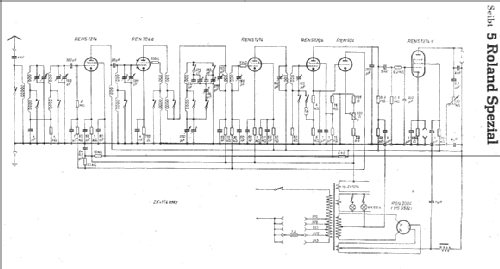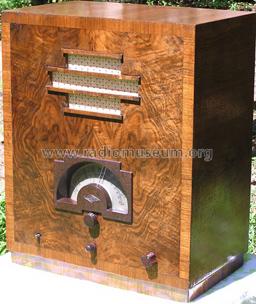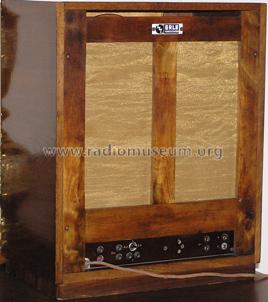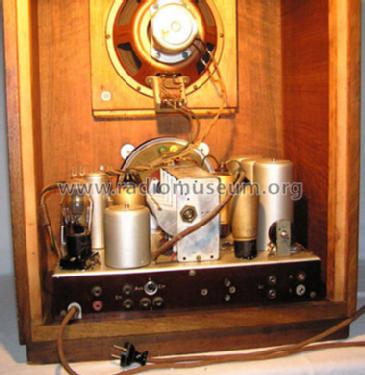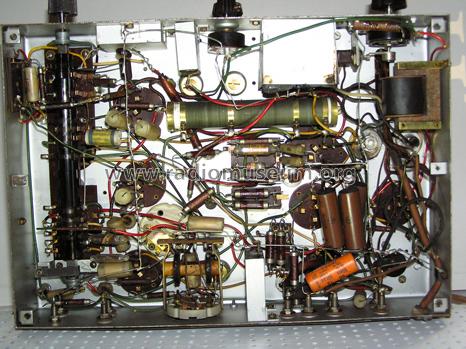Roland 5L Spezial 8 kreis 7 Rö
Seibt, Dr. Georg (Nachf.); Berlin, auch München
- Pays
- Allemagne
- Fabricant / Marque
- Seibt, Dr. Georg (Nachf.); Berlin, auch München
- Année
- 1932–1934
- Catégorie
- Radio - ou tuner d'après la guerre 1939-45
- Radiomuseum.org ID
- 5759
Cliquez sur la vignette du schéma pour le demander en tant que document gratuit.
- No. de tubes
- 7
- Principe général
- Super hétérodyne avec étage HF; FI/IF 114 kHz
- Circuits accordés
- 8 Circuits MA (AM)
- Gammes d'ondes
- PO et GO
- Tension / type courant
- Alimentation Courant Alternatif (CA) / 110-240 Volt
- Haut-parleur
- HP dynamique à électro-aimant (électrodynamique) / Ø 20 cm = 7.9 inch
- Matière
- Boitier en bois
- De Radiomuseum.org
- Modèle: Roland 5L Spezial [8 kreis 7 Rö] - Seibt, Dr. Georg Nachf.;
- Forme
- Modèle de table vertical (pas forme catédrale)
- Dimensions (LHP)
- 475 x 585 x 285 mm / 18.7 x 23 x 11.2 inch
- Remarques
- wie 5L (8 Kreis 7 Rö) aber mit Gehäuse vom Roland 53.
- Poids net
- 17.5 kg / 38 lb 8.7 oz (38.546 lb)
- Source
- -- Collector info (Sammler) / Radiokatalog Band 1, Ernst Erb
- Source du schéma
- Lange-Nowisch
- D'autres Modèles
-
Vous pourrez trouver sous ce lien 416 modèles d'appareils, 357 avec des images et 204 avec des schémas.
Tous les appareils de Seibt, Dr. Georg (Nachf.); Berlin, auch München
Collections
Le modèle Roland fait partie des collections des membres suivants.
Contributions du forum pour ce modèle: Seibt, Dr. Georg: Roland 5L Spezial
Discussions: 2 | Publications: 16
Esteemed colleagues,
Could some member explain the jack inputs (2) on the rear chassis, immediately below the loudspeaker L ein-aus switch, which are designated with the letter T.
From the underside of the chassis there is a 50uF at 50 WVDC elko which connects to one of the 2 "T" terminals?
I understand from the historical pages" of the Museum of Sound Recording that a gentleman named Herr Kurt Stille was instrumental in patenting a "wire audio recorder" - the Telegraphone; and he also developed the Textophon (a wire dictation machine) in the early 1930s. I apologize if I have used inappropraite terminolgy for the instruments.
In early 1934 I believe the manufacturing firm C Lorenz (aided by radio engineer Semi Begun), had developed a "tape-type" recorder.
Is it possible that some of the Seibt Roland 5 series radios had the capability to "play back" the output signals from the early Textophon devices or the earliest AEG recorder/players?
Respectfully,
Robert
Could some member explain the jack inputs (2) on the rear chassis, immediately below the loudspeaker L ein-aus switch, which are designated with the letter T.
From the underside of the chassis there is a 50uF at 50 WVDC elko which connects to one of the 2 "T" terminals?
I understand from the historical pages" of the Museum of Sound Recording that a gentleman named Herr Kurt Stille was instrumental in patenting a "wire audio recorder" - the Telegraphone; and he also developed the Textophon (a wire dictation machine) in the early 1930s. I apologize if I have used inappropraite terminolgy for the instruments.
In early 1934 I believe the manufacturing firm C Lorenz (aided by radio engineer Semi Begun), had developed a "tape-type" recorder.
Is it possible that some of the Seibt Roland 5 series radios had the capability to "play back" the output signals from the early Textophon devices or the earliest AEG recorder/players?
Respectfully,
Robert
Robert Sarbell † 22.3.22, 13.Sep.06
Gentlemen,
I believe there are still some final corrections to the Roland 5 series according to the information provided by Herr Birkner. There is possibly another configuration which may be identified as a Roland 5L Spezial - with minor circuit changes.
Respectfully,
Robert
I believe there are still some final corrections to the Roland 5 series according to the information provided by Herr Birkner. There is possibly another configuration which may be identified as a Roland 5L Spezial - with minor circuit changes.
Respectfully,
Robert
Robert Sarbell † 22.3.22, 24.Aug.06
